
Abderrahman Sadik Karim born at 2 March 1962 in Kirkuk was Minister of Environment in the first cabinet appointed by the Interim Iraq Governing Council in September 2003. A Kurd, Karim is an engineer and environmental activist.

Abderrahman Sadik Karim born at 2 March 1962 in Kirkuk was Minister of Environment in the first cabinet appointed by the Interim Iraq Governing Council in September 2003. A Kurd, Karim is an engineer and environmental activist.

Abd al-Karim Qasim Muhammad Bakr al-Fadhli al-Zubaidi was an Iraqi Army brigadier and nationalist who came to power when the Iraqi monarchy was overthrown during the 14 July Revolution. He ruled the country as the prime minister until his downfall and execution during the 1963 Ramadan Revolution.

Ibrahim Abd al-Karim al-Eshaiker, also known as Ibrahim al-Jaafari, is an Iraqi politician who was Prime Minister of Iraq in the Iraqi Transitional Government from 2005 to 2006, following the January 2005 election. He served as Minister of Foreign Affairs from 2014 to 2018.
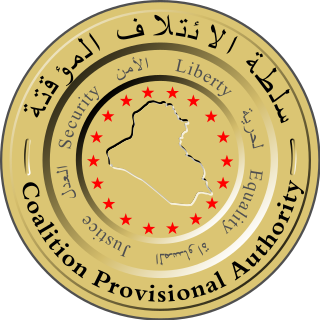
The Iraqi Governing Council (IGC) was the provisional government of Iraq from 13 July 2003 to 1 June 2004. It was established by and served under the United States-led Coalition Provisional Authority (CPA). The IGC consisted of various Iraqi political and tribal leaders who were appointed by the CPA to provide advice and leadership of the country until the June 2004 transfer of sovereignty to the Iraqi Interim Government.

ʿAbd al-Salam Mohammed ʿArif al-Jumayli was the second president of Iraq from 1963 until his death in a plane crash in 1966. He played a leading role in the 14 July Revolution, in which the Hashemite monarchy was overthrown on 14 July 1958.
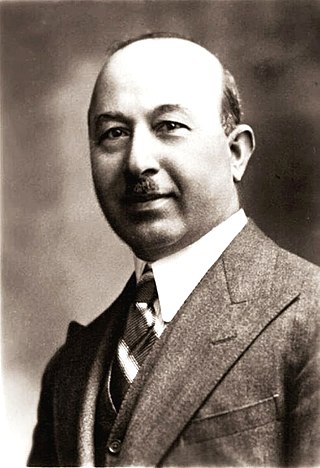
Ali Jawdat al-Ayoubi was Prime Minister of Iraq from 1934–1935, 1949–1950, and in the latter half of 1957. His father was of Kurdish origin and his mother of Arab origin.
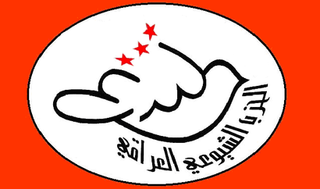
The Iraqi Communist Party is a communist party and the oldest active party in Iraq. Since its foundation in 1934, it has dominated the left in Iraqi politics. It played a prominent role in shaping the political history of Iraq between its foundation and the 1970s. The Party was involved in many of the most important national uprisings and demonstrations of the 1940s and 1950s. It suffered heavily under the Ba'ath Party and Saddam Hussein but remained an important element of the Iraqi opposition and was a vocal opponent of the United Nations sanctions imposed on Iraq after the Gulf War of 1991. It opposed the United States invasion of Iraq in 2003 but since then has participated in the new political institutions. It received little support in the Iraqi general elections of 2005. The party gained some seats in each province in which the 2013 Iraqi governorate elections were held.
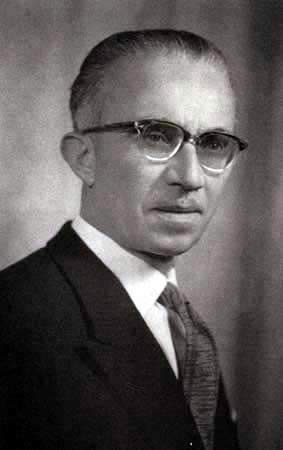
Nazim al-Qudsi, was a Syrian politician who served as President of Syria from 14 December 1961 to 8 March 1963.
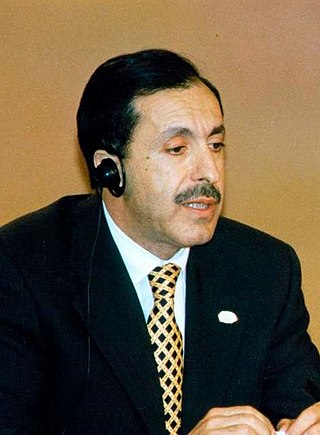
Abdul Karim al-Kabariti is a Jordanian politician and businessman who was the 30th Prime Minister of Jordan from 4 February 1996 to 9 March 1997.

Iraq has had three vice presidents or deputy presidents serving concurrently.
Mustafa Karim Abdullah is an Iraqi football manager and former player. He played as striker, and was known for his ability to score with both feet.

The 14 July Revolution, also known as the 1958 Iraqi military coup, was a coup d'état that took place on 14 July 1958 in Iraq which resulted in the toppling of King Faisal II and the overthrow of the Hashemite-led Kingdom of Iraq. The Iraqi Republic established in its wake ended the Hashemite Arab Federation between Iraq and Jordan that had been established just six months earlier.

Ministry of Foreign Affairs of the Republic of Iraq is a cabinet ministry of Iraq, responsible for conducting foreign relations of the country.

German-Iraqi relations are foreign relations between Germany and Iraq. Iraq has an embassy in Berlin, while Germany maintains an embassy in Baghdad and a consulate general in Erbil.
The Ministry of Finance is the Iraq government agency responsible for public finance of Iraq, Central Bank of Iraq, and banking regulations. The current Minister of Finance is Ihsan Adbul Jabbar Ismael.

The Iraqi Republic, colloquially known as the First Iraqi Republic, as well as Qasimist Iraq (1958–1963) and Nasserist Iraq (1963–1968), was a state forged in 1958 under the rule of President Muhammad Najib ar-Ruba'i and Prime Minister Abd al-Karim Qasim. ar-Ruba'i and Qasim first came to power through the 14 July Revolution in which the Kingdom of Iraq's Hashemite dynasty was overthrown. As a result, the Kingdom and the Arab Federation were dissolved and the Iraqi republic established. Arab nationalists later took power and overthrew Qasim in the Ramadan Revolution in February 1963, and then Nasserists consolidated their power after another coup in November 1963. The era ended with the Ba'athist rise to power in a coup in July 1968.
ʻAbd al-Karīm is a Muslim male given name and, in modern usage, also a surname. It is built from the Arabic words ʻabd and al-Karīm, one of the names of God in the Qur'an, which give rise to the Muslim theophoric names. It means "servant of the most Generous". It is rendered as Abdolkarim in Persian, Abdulkerim in Albania, Bosnia and Abdülkerim in Turkey.
Karim Saddam Menshid is an Iraqi football forward who played for Iraq in the 1986 FIFA World Cup. He also played for many Iraqi clubs : Al Sinaa, Al Jaish, Al-Rasheed, Al Zawraa, Racing Club Beirut & Al Shorta, Karim Saddam had been Top scorer of Iraqi League for 4 times. He scored unforgettable goal against UAE in 1986 FIFA World Cup Qualification which secured Iraq to go throw to the next stage.
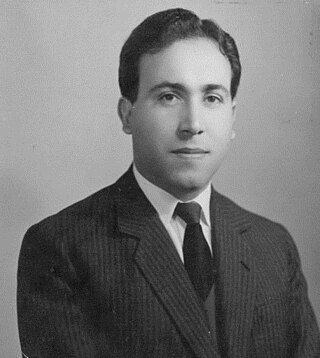
Fuad al-Rikabi was an Iraqi politician and a founder of the Iraqi Regional Branch of the Arab Socialist Ba'ath Party. Al-Rikabi became the Secretary of Iraqi Regional Command of the Ba'ath Party in 1954 and held the post until 1959. Throughout his term of leadership, the Iraqi Regional Branch expanded its membership and became a leading party in Iraq's political landscape. Following the 14 July Revolution of 1958 which toppled the monarchy, al-Rikabi was appointed Minister of Development in Abd al-Karim Qasim's unity government.

Najmiddin Karim, also known as Najmaldin Karim, was an Iraqi Kurdish politician who was governor of Kirkuk Governorate from 2011 to 2017. Prior to the invasion of Iraq, Karim had served in numerous Kurdish and Iraqi opposition groups.

The following lists events that happened during 1959 in Iraq.